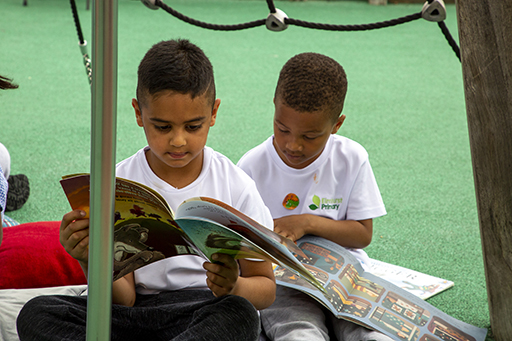1 What is Reading for Pleasure?
Reading for Pleasure is a term that has been adopted in educational policy and curricula across the UK nations; in other countries the terms ‘free reading’, ‘voluntary reading’, ‘leisure reading’ or ‘recreational reading’ are also used. In essence, Reading for Pleasure is ‘reading that we do of our own free will, anticipating the satisfaction that we will get from the act of reading’ (Clark and Rumbold, 2006, p. 6). It is the reading you do for pure enjoyment, for relaxation, for the suspense, thrill or emotion you experience or for the information that you seek.

For adults and children, Reading for Pleasure may involve fiction – in novels or picture storybooks – and a wide range of other texts, both paper-based and digital. Many people read magazines, recipe books, holiday brochures, comics, football scores, information leaflets, religious texts, non-fiction books, poetry and much more, simply for the pleasure, information and enjoyment that this brings. Essentially, Reading for Pleasure is reading that you choose to engage in and that you are motivated to sustain, or return to, because of your own intrinsic interest.
Being read to can also be a pleasurable experience and shared book reading between adults and children and group ‘read-alouds’ are, in-and-of-themselves, enjoyable experiences that nurture children’s desire to read. In later sessions in this course, you will explore the value of shared, social reading events for building the habit of choice-led reading in childhood.
Encouraging and enabling children to choose to read both at school and at home is an important issue for educators and parents, because there is far more than enjoyment at stake. Research has evidenced a wide range of educational, personal, social and emotional benefits of childhood reading.
SAQ _unit2.1.1 Personal reflection 1
Take a moment to reflect on the range of materials you have chosen to read in the past week. Make a note of the different texts you have chosen to read.
If you haven’t already, you can download a copy of the learning journal [Tip: hold Ctrl and click a link to open it in a new tab. (Hide tip)] now to save and use throughout the course. Remember, only you can see what you write here; OpenLearn and the course team will not have access.
Comment
If you are currently reading a novel, this might have been the first thing that came to mind. However, you might have browsed a website looking at holiday destinations, read a thread on social media that amused you, or engaged in perusing a magazine. Your reflections have probably highlighted that Reading for Pleasure involves much more than books!
In the next section you will explore the connection between Reading for Pleasure and educational attainment.
